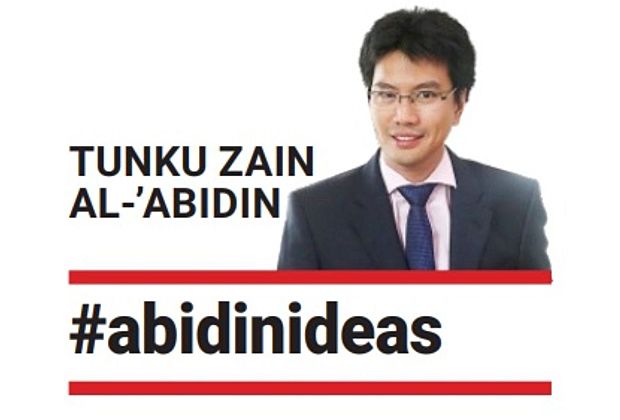
 I WAS pleased to accept an invitation from Akademi Kenegaraan Malaysia to address young Malaysians about constitutional monarchy and parliamentary democracy and my various roles.
I WAS pleased to accept an invitation from Akademi Kenegaraan Malaysia to address young Malaysians about constitutional monarchy and parliamentary democracy and my various roles.
It was my second big speech in Parliament, the first being the inaugural Speaker’s Series (Parliament and Civil Society: the Voice of the Rakyat) in 2018.
I’m glad that the current Speaker continues to invite outsiders to address audiences at the heart of our democracy.
Around the world, constitutional monarchy with democracy is a highly successful form of government, reflected in many indices of economic prosperity, freedom and political stability, probably because important elements of good governance are incentivised.
Inheritance incentivises multi-generational institutions rather than short-term political gain; yet, constitutions defend against dictatorship while the legislative and executive branches emerge out of democratic processes.
It allows for an apolitical head of state as a symbol of unity, often with a military or religious role denied to politicians.
If something drastic does happen, a monarch can help restore democracy, as happened in Spain and Thailand in history.
Local analysts and foreign diplomats alike have told me that the Yang di-Pertuan Agong was crucial in ensuring peaceful political transitions after the general elections of 2018 (Barisan Nasional’s first loss) and 2022 (our first hung Parliament).
Adding the important element of federalism (since our nation is the culmination of distinct states coming together), Malaysia’s fusion of ancient and modern institutions is unique.
Today, the constitutional role of the Yang di-Pertuan Agong, the Conference of Rulers and the Ruler of each state is defined in the Federal and State Constitutions. This includes a role in the appointments of senior officeholders (including that of the prime minister), deliberating on national issues, and being Head of Islam, fountain of honours and granting pardons.
Convention augments these roles. Public universities and different parts of the armed forces often have a ceremonial royal head.
Similarly, charitable foundations, voluntary organisations and sporting bodies often have royal patrons, usually based on their actual passions and causes.
These all contribute to defining national leadership, further enhancing moral authority and experience.
In participating in this context, I feel fortunate to be able to express my own areas of interest.
In the United Kingdom, I met two policy-minded Malaysians, spurring the establishment of the Institute for Democracy and Economic Affairs (Ideas) in 2010.
I’m proud that we have contributed to debates, legislation and the national narrative.
We’ve participated in institutional reforms and in researching, advocating and commentating on almost every area of public policy.
Entrenched interests often do not want to see reforms, especially when corruption might be uncovered.
Yet, we have found support across all political parties, especially from backbenchers and from other civil society organisations, with whom we are able to cooperate even if sometimes we disagree on other matters.
I’m proud of two institutions that emerged out of Ideas research: Ideas Autism Centre, which provides care and therapies for children who are on the autism spectrum from B40 families; and Ideas International, a low-cost private school that educates Malaysians and refugees together.
Through roles at Universiti Sains Islam Malaysia, Universiti Kebangsaan Malaysia, UCSI University, the Jeffrey Cheah Foundation and ICAN College, I see how public and private higher education institutions contribute to the future of Malaysia.
Through Excelerate, I’m excited about collaborations that will upskill the nation’s workforce.
As president of Persatuan Squash Negri Sembilan, I’ve met kids of every background who are united in their passion for the game, inspired by our multicultural heroes of past and present, and I see similar energy in tennis, pickleball and padel.
Similar diversity and optimism I feel through various arts (especially musical) organisations, even though they always need help in terms of resources.
The nation’s optimism is protected by the service of active soldiers and veterans, from whom I have learnt much about defence policy, military assets and the welfare of our armed forces personnel. Their readiness is of vital importance in our geopolitical reality.
Gratifyingly, I’ve seen so many young Malaysians who wish to understand and advocate for all these sectors.
They are students or volunteers; some intellectual, others street fighters; some inspired by beauty and potential, others passionate against injustice and inefficiency.
They love environmental sustainability, or children’s and refugee rights, or animal welfare, or institutional reform.
But also crucial are the courageous entrepreneurs who provide jobs, goods and services while shaping our economy.
Indeed, there are many different types of leaders, from many backgrounds and experiences, and all have a legitimate role to play in our nation.
If we mutually accept this as a starting point of wanting to create a shared destiny together, I remain confident that our system of government will deliver and last for centuries to come.
Adapted from the author’s speech at Suarasa Putera Raja: Inspirasi Kepimpinan Generasi Madani, Sept 11, 2025. The views expressed here are the writer’s own.










